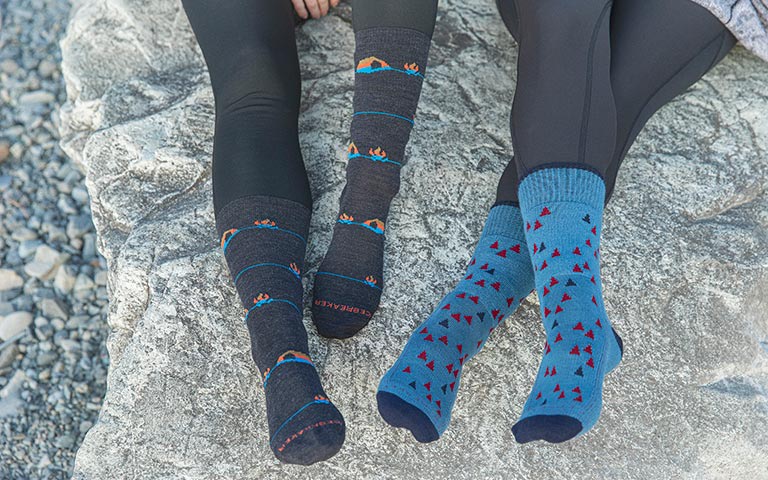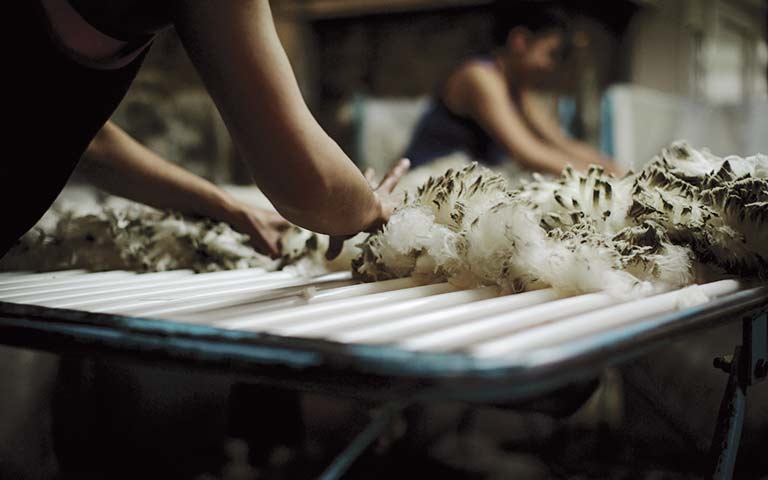Will merino wool shrink after washing?
28 September 2020 | Marie Knowles
Merino is nature’s performance fibre, able to stretch and bounce back to shape. Writer Marie Knowles explains why icebreaker merino is durable and long-wearing and won’t shrink in the wash.
Our merino garments are easy-wear and easy-care. In fact, you can clean them in a washing machine without them shrinking. Merino fibres have an internal spring-like coil that holds the fibre’s shape. So, even our beautiful, soft knitwear is machine-washable. Just follow our simple care tips, below:
-
Normal machine wash
Use a normal warm or cool machine wash cycle with regular powder or liquid detergent. Separate light and darks as usual. Don’t use bleach, or softeners, which affect the natural performance properties of the merino fibre. -
Hang to dry
With the exception of socks, hang your garment to dry on the line. You can tumble dry your socks, turned inside out, and on a low heat. -
Store folded
Always clean your garments before storing – this helps prevent odours, stains and the build-up of dirt. For best results, store folded rather than hung.
Naturally stretchy
Merino wool is a naturally resilient and stretchy fibre, thanks to its internal spring-like structure. You can extend it 30% of its length without it breaking. And if you stretch it to 20% of its length it will bounce right back to the original. This means that when you wear our merino wool pieces, whether it’s socks out on the trail or our 100% merino base layer tops, they will keep their shape wear after wear.
Merino wool fibres are actually stretchier than nylon. Tests show that if you stretch nylon it breaks at 10% extension, versus merino’s 30%. Similarly, polyester fibres also stretch to a lesser extent than merino wool.
Naturally durable
The merino sheep is one of the world’s toughest breeds. It’s able to thrive in the extremes of its rugged mountain home because of the natural engineering of its fleece. If its wool fibres were not strong and durable for maximum protection, the sheep would not survive. That’s why we call merino nature’s performance fibre.
Naturally sustainable
Because merino fibre is made in the mountains, rather than a petrochemical laboratory, it’s naturally renewable and biodegradable (under certain conditions). Unlike synthetic microfibres, which are made from plastic, merino fibres don’t contribute to plastic microfibre pollution in the ocean. Synthetic microfibres are washed out of clothing – up to 700,000 in a full load of washing – and end up in our waterways and oceans. Wearing clothes with a high natural fibre content can help reduce the amount of synthetic microfibres that are released into the environment.
More care tips
Want to get the most out of your icebreaker? Here are some more tips:
-
Avoid fabric softener
It coats the merino fibres and reduces their natural ability to breathe and regulate moisture and temperature. -
Only dry clean if the label says so
Some icebreaker merino garments are suitable for dry cleaning, but always check the label first. -
Limit ironing
Merino bounces back into shape easily after washing, so you may find that you don’t need to iron your merino at all. Instead let any creases fall out naturally by laying your garment out flat, or hanging it over the back of a chair. However, if you do need to iron use a cool or specific wool setting and turn your garment inside out. -
Avoid bleach
Chlorine destroys merino wool fibres, so please keep it away from your icebreaker.
You can find our full care guide here
More for you

Are merino socks good for hiking?
26 August 2020 | Marie Knowles

Why is merino wool good to wear?
19 August 2020 | Jamie Patterson

Can I wear merino wool in summer?
30 July 2020 | Marie Knowles










